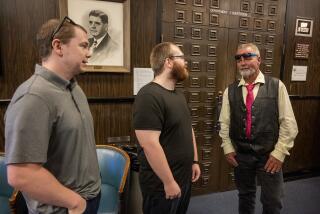Cyber-bully verdict is mixed
A federal jury’s decision Wednesday to acquit a Missouri mother accused of using MySpace to intentionally perpetrate a cruel Internet hoax on a vulnerable teenage girl marked a setback for prosecutors who had wanted to send a message that cyber-bullying was a serious crime with serious ramifications.
Instead, the jury in Los Angeles convicted 49-year-old Lori Drew of three misdemeanor computer crimes for her role in setting up the MySpace account in the name of a fictitious 16-year-old boy and using it to lure 13-year-old Megan Meier into an online relationship.
Megan committed suicide two years ago after the “boy” whom she had come to know as “Josh Evans” sent her a message saying, “The world would be a better place without you,” prosecutors alleged.
Prosecutors had touted the case as the first of its kind in the nation, and it was closely monitored by the online social networking industry. Had Drew been convicted of the felonies with which she was charged she would have faced up to 20 years in prison. The misdemeanor convictions mean she faces a potential three-year prison term, but probably less. The six-man, six-woman panel deadlocked on a conspiracy charge that prosecutors are considering whether to refile.
Rebecca Lonergan, a former federal prosecutor in Los Angeles who now teaches law at USC, said she doubted the case would have been prosecuted absent Megan’s death. Because of her death, Lonergan said she was not surprised by what she called the jurors’ “compromise verdict” in the case.
“They didn’t want to let the defendant completely off the hook because what this woman did was distasteful at best,” Lonergan said.
Online safety experts said the verdict puts the onus on social networking sites to police their customers’ activities.
“I think the industry was hoping there would be a strong verdict blaming one user for abusing another because that way it’s not their fault,” said Linda Criddle, a safety expert. “These companies claim to have good standards and then do nothing to enforce them. They let people breach their terms and conditions and do nothing about it.”
Asked at a news conference whether he was happy with the outcome of the case, U.S. Atty. Thomas P. O’Brien said, “We don’t deal in terms of happiness or sadness” in criminal cases.
Drew’s attorney, H. Dean Steward, said his client was relieved that she was not convicted of a felony but that she continues to feel “deep sadness” over Megan’s death.
“Because of the tragedy, there’s no joy,” he said of his client’s reaction to the verdict.
Megan Meier’s mother, Tina, who joined O’Brien at the news conference, said she was disappointed that her former neighbor was not convicted of a felony. But she thanked O’Brien and other prosecutors on the case for filing charges against Drew after authorities in Missouri had declined to do so.
Meier described the verdicts as “a steppingstone” in her fight to ensure that no other family has “to go through what I had to endure.”
O’Brien said at the news conference that he had read about the case in the media and that lawyers in his office determined that it could be prosecuted in Los Angeles because MySpace is based in Beverly Hills. His office indicted Drew this spring.
After the indictment, O’Brien took the unusual step of becoming personally involved in the case.
He traveled to Missouri to interview potential witnesses before the trial. During the trial, he made the prosecution’s opening statement and part of its closing arguments as well as questioning several key witnesses.
O’Brien brushed aside a question about his hands-on role.
“Every lawyer in my office is a trial lawyer,” he said. “I’d like to think, even me.”
Despite the misdemeanor verdicts, the case could still be thrown out altogether: U.S. District Judge George H. Wu has yet to rule on a defense motion to have the case dismissed because prosecutors failed to prove that Drew had intentionally violated MySpace rules when creating the bogus profile. Wu has given no indication as to when he would rule on the motion.
As jurors streamed out of the courtroom Wednesday, nearly all declined to speak with reporters.
One, who identified himself only by his first name of Marcilo, said he felt the case was a tragedy both for the Meiers and the Drews, and that neither family could have anticipated what happened.
He declined to discuss the jurors’ deliberations in detail.
The verdicts capped a five-day trial in which a real-life, small-town soap opera played out in a cavernous federal courtroom halfway across the country.
The trial centered on the events leading up to Megan’s death on Oct. 16, 2006, in the St. Louis suburb of Dardenne Praire, where the Drews and Meiers lived four doors away from each other.
Prosecutors portrayed Drew as a mean-spirited and irresponsible adult who gleefully participated in the hoax on Megan, along with her then 13-year-old daughter, Sarah, and 18-year-old Ashley Grills, Drew’s employee.
They claimed that while the scheme began as an effort to find out whether Megan had been spreading rumors about Sarah, it later evolved into a plot to embarrass Megan by printing out her communications with “Josh” and showing them to other girls to embarrass her.
Steward assailed the government’s case as a misguided effort to seek vengeance for Megan’s death.
He suggested that Grills, who was given immunity in exchange for cooperating with prosecutors, exaggerated Drew’s role and minimized her own.
Ultimately, jurors seemed to adopt a more benign view of Drew’s conduct.
Speaking with reporters after the verdicts, Steward responded to a question about why Drew seemed to show so little emotion during the trial, even as her own daughter was reduced to tears on the witness stand.
He said Drew has been “under assault” since her alleged role in the case was revealed.
“That’s made her incredibly defensive,” he said.
--
Times staff writer Jessica Guynn contributed to this report.







